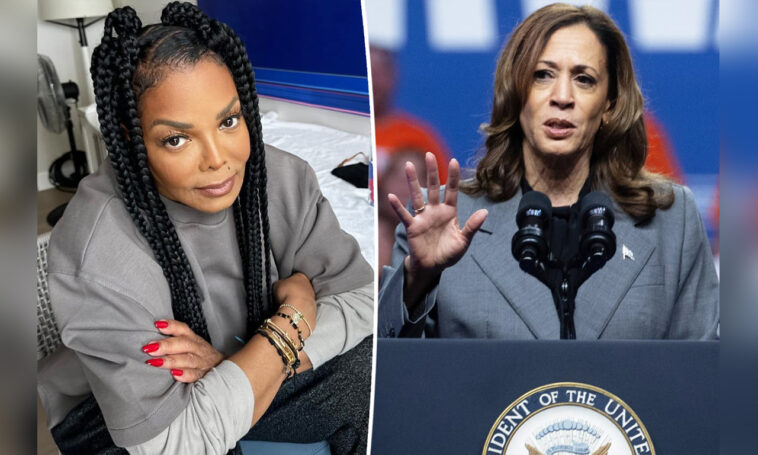Janet Jackson has recently faced a wave of criticism after questioning Vice President Kamala Harris’ race in an interview with The Guardian, published over the weekend. During the conversation, Jackson, a music icon known for hits like “That’s The Way Love Goes,” made statements that many found both offensive and inaccurate.
“She’s not Black. That’s what I heard. That she’s Indian,”
The 58-year-old singer said during a discussion about current political events and the state of the nation.
Jackson also went on to state,
“Her father’s white. That’s what I was told. I mean, I haven’t watched the news in a few days. I was told that they discovered her father was white.”
These remarks were swiftly refuted by fans and social media users alike, who pointed out that Kamala Harris, currently 59, is of both Jamaican and Indian descent. Harris’ father is of Jamaican heritage, while her mother hailed from India, making her a reflection of the multiracial and multicultural identity that has become a hallmark of American diversity.
Jackson’s remarks seemed to catch many by surprise, especially given Harris’ prominent role in American politics as the first female vice president, the first African-American, and the first Asian-American to hold this office. For many, Harris represents the complex racial and ethnic fabric of America, and her mixed background is widely known and celebrated.
Fans were quick to express their outrage over Jackson’s inaccurate and misleading statements on social media, particularly on X (formerly Twitter). One user reacted strongly, saying, “This is why she’s irrelevant and leeching off of her brothers’ success.” This comment referenced Jackson’s connection to her late brother, Michael Jackson, whose fame was monumental.
Michael Jackson himself became a subject of scrutiny when his appearance changed significantly in the 1990s, leading many to speculate about his race and the color of his skin. It was later revealed that Michael had vitiligo, a skin disorder that causes loss of pigmentation, as confirmed by the Mayo Clinic. Despite the explanation, the debate surrounding Michael Jackson’s appearance continued for years, fueling misunderstandings about race and identity.
Several X users drew parallels between Janet’s recent comments and the controversies that surrounded her brother Michael. One user noted, “Janet, you know better than to believe that nonsense… especially after all the race controversies Michael went through.” This reaction alluded to the fact that the Jackson family has long been in the public eye, and the issues surrounding race and identity should not be foreign to them, particularly given their experiences in the entertainment industry.
Another social media user expressed frustration over Janet’s remarks, tweeting, “‘That’s what I heard’ is the new way of saying ‘I believe the stupid, unsubstantiated stuff people tell me.'” The comment underscored the frustration that many felt over the casual spread of misinformation, especially in an era where facts and truth are increasingly contested.
Other users pointed out that Jackson’s remarks felt especially strange given Harris’ long and public career, where her racial and ethnic identity has been well-known and well-documented. One tweet read, “I did not know she was Black until a number of years ago when she happened to turn Black, and now she wants to be known as Black.” This comment appeared to mock the way in which some people shift their understanding of identity based on misinformation or incomplete narratives.
The backlash against Janet Jackson’s comments reflects the sensitivity and complexity of discussions about race, identity, and ethnicity in the modern world. The public’s swift reaction shows how misinformation can spread quickly, but it also highlights how individuals, especially public figures, are held accountable for their statements. In an era where facts can be easily verified, many expect that celebrities like Jackson will approach such topics with care and accuracy, rather than relying on hearsay or speculation.
Kamala Harris’ identity as a Black and South Asian woman has been a significant part of her political narrative, symbolizing the increasing diversity within America’s political leadership. As the conversation surrounding Jackson’s remarks continues, it serves as a reminder of the importance of understanding and respecting the complex identities that many individuals hold in today’s multicultural society.






Join the Community and Be a Part of the Conversation
You must be logged in or registered to post a comment.